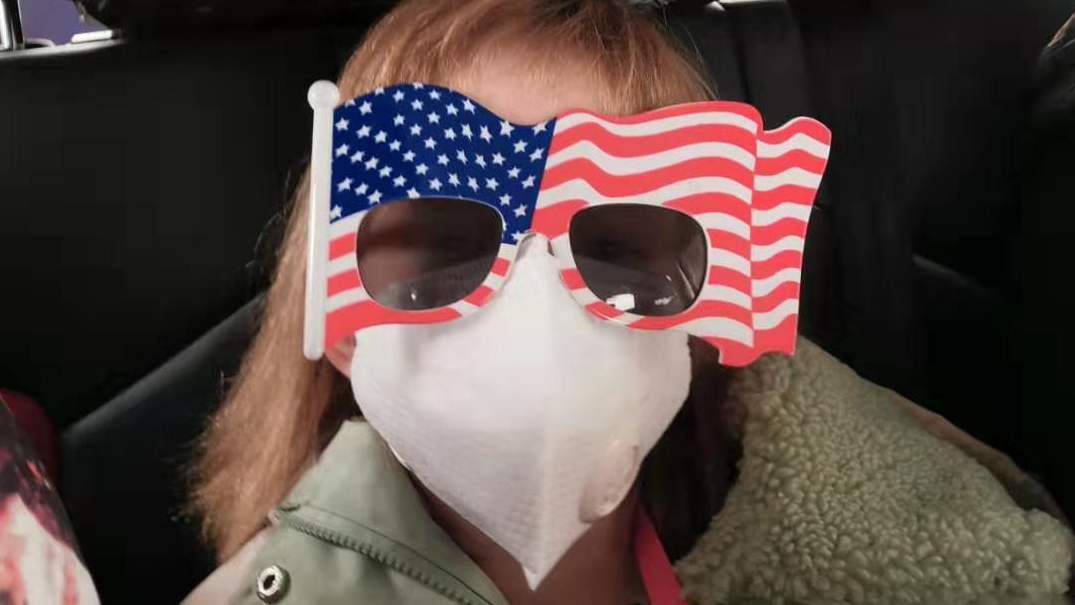Coronavirus: Americans Cheer As Evacuation Flight From Wuhan Reaches U.S.

Hermione Dickey, 8, and her mother, Priscilla, are among the passengers on a U.S. evacuation flight out of Wuhan, China. She’s seen here during the car ride to Wuhan Tiange International Airport.
Priscilla Dickey via AP
Updated at 12:08 p.m. ET
More than 200 Americans who were evacuated from Wuhan, China, because of the deadly new strain of coronavirus cheered as their plane landed in Alaska late Tuesday. It was a moment of relief and joy, even as health workers rushed to ensure that passengers don’t have the respiratory virus.
“The whole plane erupted in cheers when the crew said, ‘Welcome home to the United States,’ ” said Anne Zink, Alaska’s chief medical officer. She described the scene as “a moving and uplifting experience.”
The chartered airliner — a Kalitta Air Boeing 747 — then took off for the March Air Reserve Base in California’s Riverside County, about 65 miles east of Los Angeles. It landed shortly after 8 a.m. local time, according to the flight tracking site Flightradar24.
The flight was organized by the U.S. State Department to get diplomats, their families and other Americans out of Wuhan, the city that is the center of the fast-growing outbreak.
Before they headed to California, the 201 passengers onboard had already undergone four health screenings: two in Wuhan before their flight took off, and two after they arrived in Anchorage.
The passengers were “approved to continue on to California by the Centers for Disease Control and Prevention,” the Alaska Department of Health and Social Services said in a news release Wednesday.
In California, the passengers will be screened once again and “temporarily housed for a period of time,” the Alaska health department said.
The passengers will remain at the March air base for additional screening. While there, they will be cared for by the Department of Health and Human Services. In a statement about their arrival, Department of Defense Press Secretary Alyssa Farah said, “DoD personnel will not be directly in contact with the evacuees and evacuees will not have access to any base location other than their assigned housing.”
The evacuees will be closely monitored for any sign of the coronavirus. If anyone falls ill, they will be taken to a local civilian hospital, Farah added.
“Alaska is proud to do its part in helping our fellow Americans come home safely,” Gov. Mike Dunleavy said, applauding the rigorous screenings the passengers underwent. “For our fellow Americans on the airplane, we wish them godspeed as they head to California and ultimately to their homes.”
Since it was first identified in Wuhan last month, the novel coronavirus, or 2019-nCoV, has killed 132 people, all of them in mainland China. There are currently more than 6,000 confirmed cases, according to a tracking map created by Johns Hopkins.
The vast majority of the cases also are in China, primarily in Hubei province, where Wuhan has been placed under a virtual lockdown in an attempt to prevent the spread of the virus. But cases of coronavirus have emerged in more than a dozen other countries, including the U.S. and Canada.
Several international airlines have suspended or reduced flights to China, from British Airways to carriers in South Korea and Indonesia. Kazakhstan has halted all mass transportation — flights, train and buses — to neighboring China.
Similar to the U.S. evacuation flight, a Japanese flight from Wuhan landed safely in Tokyo on Wednesday.
“Of course, decisions on evacuating citizens is up to the countries,” WHO Director-General Tedros Adhanom Ghebreyesus said Wednesday. “But one thing WHO advises is that they have to prepare themselves if there is importation of cases. So they need to really have a thorough understanding, comprehensive, on their actions.”
The CDC says that while it considers the immediate risk posed by the coronavirus as “low,” travelers should avoid any nonessential travel to China.
“The outbreak is growing and there is limited access to adequate medical care in affected areas,” the CDC said earlier this week.
The agency also recommends that people take simple steps to reduce the chances of spreading any respiratory illness, such as washing hands with soap and water for at least 20 seconds and avoiding close contact with anyone who is sick.
NPR’s Merrit Kennedy contributed to this report.
9(MDAxODM0MDY4MDEyMTY4NDA3MzI3YjkzMw004))








